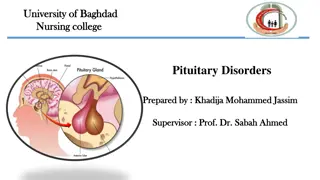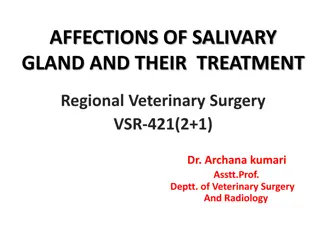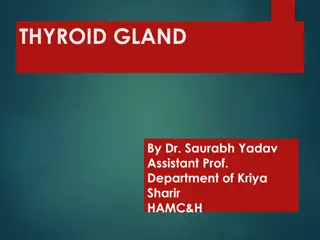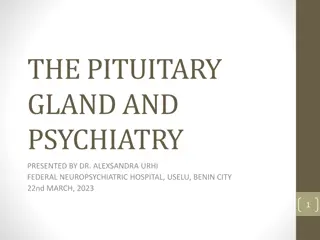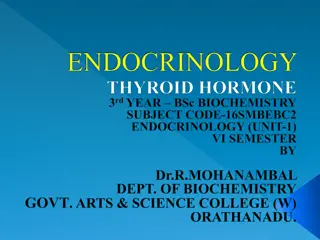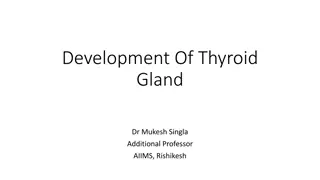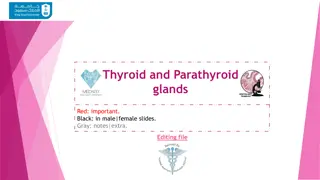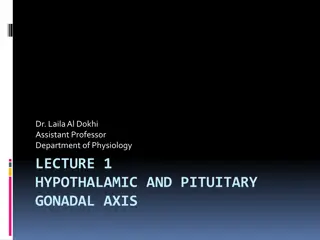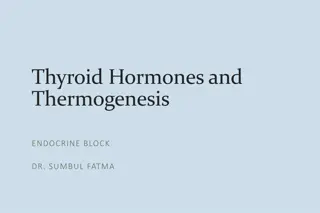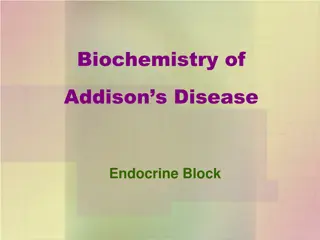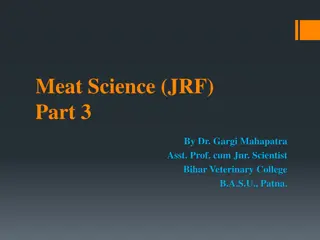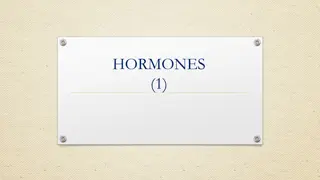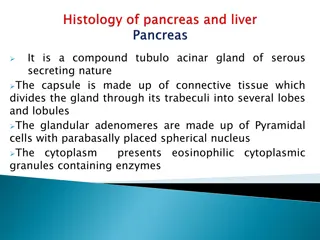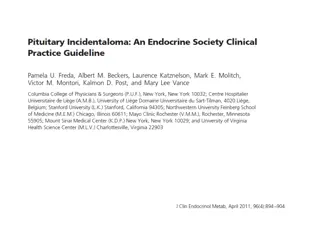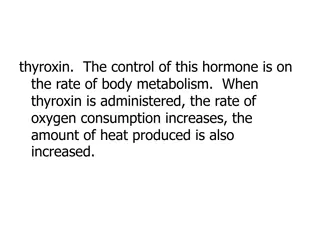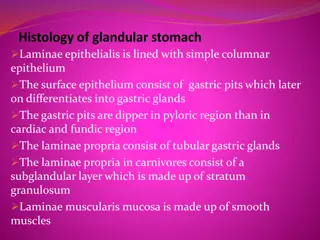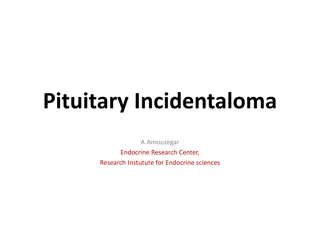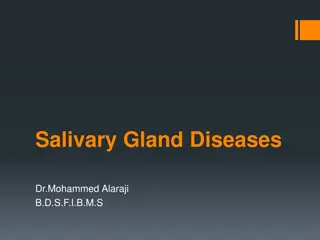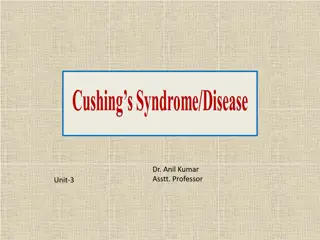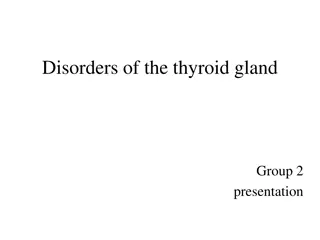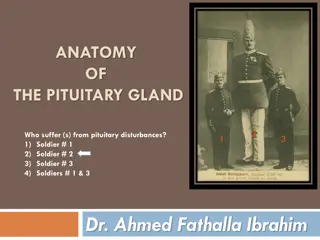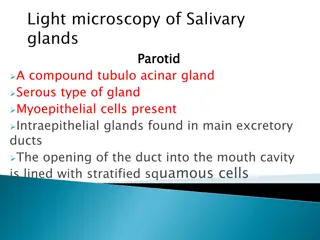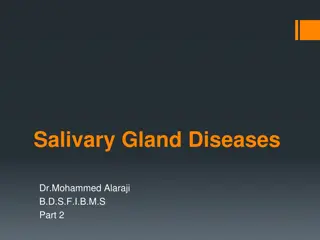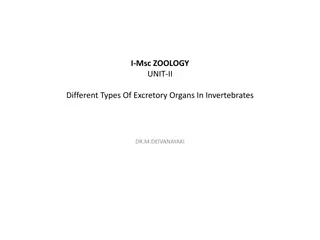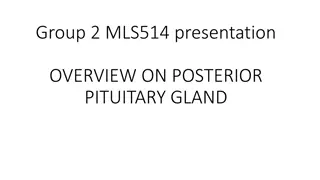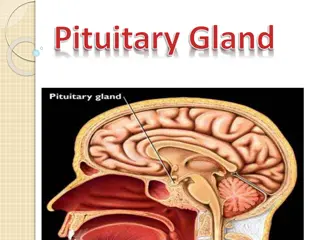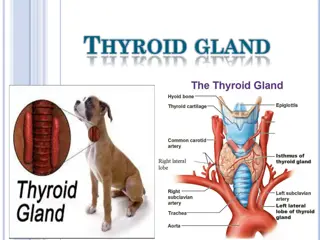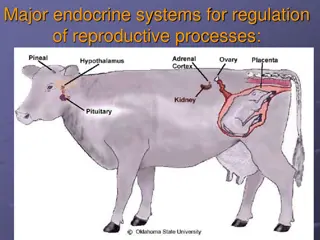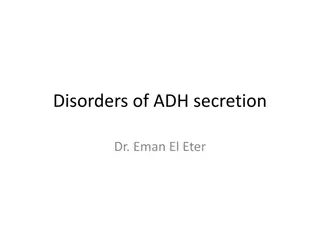Pituitary Disorders
Pituitary disorders, often caused by tumors, can disrupt hormone production leading to various symptoms like weight gain, vision problems, and hormonal imbalances. The pituitary gland plays a crucial role in regulating bodily functions through hormone secretion. Factors such as tumor growth, head in
0 views • 25 slides
Understanding Pituitary Gland Functions in Endocrinology Course
Explore the intricate workings of the pituitary gland in endocrinology, delving into hypo- and hyperfunction aspects, hormonal regulation, and physiological characteristics. Learn about the crucial role of hormones, their actions on target organs, and the specificity of their interactions with cellu
6 views • 71 slides
Understanding Hypothalamus and Pituitary Hormones in Clinical Pharmacology
Peptides and glycoproteins are secreted by the hypothalamus and pituitary, regulating anterior pituitary hormones. Hormones like adrenocorticotropic hormone (ACTH) and corticotropin-releasing hormone (CRH) play crucial roles. Synthetic adrenocorticosteroids have limited the use of corticotropin for
1 views • 28 slides
SALIVARY GLAND IMAGING
Salivary gland imaging plays a crucial role in diagnosing and monitoring diseases of the major salivary glands, including the parotid, submandibular, and sublingual glands. Different imaging techniques such as computed tomography, MRI, and ultrasound are used to visualize these glands and aid in dif
1 views • 12 slides
Understanding Sexual and Reproductive Anatomy in 5th Grade Lesson
Explore the sexual and reproductive anatomy in a 5th-grade lesson. Learn about the pituitary gland, its role in hormone production, why clothes may feel too small due to growth hormones, and the biological male and female reproductive systems. Discover the organs involved in reproduction and their f
6 views • 8 slides
Adrenal Gland
This content delves into the detailed structure and function of the adrenal gland, focusing on the differentiation between the cortex and medulla, the histological features of each zone, and the hormones produced. From the distinction of various cortical layers to the role of chromaffin cells in the
0 views • 8 slides
Affections of Salivary Glands in Veterinary Surgery: Overview and Treatment
Salivary gland affections in animals, particularly dogs, are discussed, highlighting the main pairs of salivary glands and their locations. The content covers details on the parotid, mandibular, sublingual, and zygomatic glands, along with their respective ducts. Information on congenital and acquir
0 views • 28 slides
Understanding the Thyroid Gland: Functions and Hormone Synthesis
The thyroid gland is a vital endocrine gland located below the larynx, responsible for producing thyroid hormones essential for regulating metabolism. This gland consists of follicles lined with follicular cells, producing thyroglobulin and thyroid hormones T3 and T4. Iodine plays a crucial role in
0 views • 40 slides
Understanding the Pituitary Gland: Implications in Psychiatry
This presentation by Dr. Alexsandra Urhi delves into the anatomy, function, and psychiatric implications of the pituitary gland. It explores the interplay between endocrine structures, the CNS, and psychotropic drugs' effects on the pituitary gland.
0 views • 35 slides
Overview of Pituitary Gland: Structure, Function, and Relationships
The pituitary gland, also known as the hypophysis, is an endocrine gland located at the base of the brain. It is divided into two main parts: the adenohypophysis and the neurohypophysis. The gland plays a crucial role in hormone regulation and is closely related to neighboring structures such as the
0 views • 26 slides
Buy HGH Online - buyusapeptides.com
HGH, or Human Growth Hormone, is a peptide hormone secreted by the pituitary gland. It stimulates growth, cell reproduction, and cell regeneration in humans, making it vital for development. Naturally produced in the body, HGH levels peak during chil
1 views • 5 slides
Insights into Human Growth Hormone and Its Medical Applications
Human Growth Hormone (HGH), a key hormone secreted by the anterior pituitary gland, plays a crucial role in stimulating growth and metabolism. Its therapeutic applications range from treating growth hormone deficiency in children to genetic engineering for pharmaceutical production. HGH has made sig
0 views • 18 slides
Understanding Thyroid Hormones and Their Role in Metabolism
Thyroid hormones, including triiodothyronine (T3) and thyroxine (T4), are essential for regulating metabolism, growth, development, body temperature, and heart rate. They are tyrosine-based hormones produced by the thyroid gland, requiring iodine for synthesis. T3 affects various physiological proce
2 views • 17 slides
Development of Thyroid Gland in Embryonic Stage
The thyroid gland is the first endocrine gland to develop in the human body, starting from a median endodermal thickening in the primitive pharynx. The process involves the descent of the thyroid diverticulum and formation of lobes by week 7 of embryonic development. The thyroid gland begins functio
0 views • 24 slides
Thyroid and Parathyroid Glands Histological Structure Overview
This detailed histological study covers the structure and function of the thyroid and parathyroid glands. It includes information on the stroma, parenchyma, follicular cells, parafollicular cells, and the microscopic structure of the parathyroid gland. The article also delves into the functions of v
0 views • 8 slides
Understanding the Hypothalamic-Pituitary-Gonadal Axis in Reproductive Physiology
Explore the intricate relationship between the hypothalamus, pituitary gland, and gonads in regulating reproductive functions. Learn about hormone definitions, hypothalamic-pituitary interactions, gonadotropic hormones, and feedback mechanisms crucial for reproductive control.
0 views • 13 slides
Understanding Thyroid Hormones and Thermogenesis in Endocrinology
This lecture covers the types, biosynthesis, actions, regulation, and clinical implications of thyroid hormones. It explains the functions of thyroxine (T4) and tri-iodothyronine (T3), their synthesis in the thyroid gland, and their transport in the body. The role of thyroid hormones in thermogenesi
2 views • 30 slides
Understanding the Biochemistry of Addison's Disease in the Endocrine System
Addison's Disease, a primary adrenocortical hypofunction, involves the adrenal gland's cortex and its hormone synthesis. The condition affects aldosterone and cortisol production, impacting electrolyte balance and blood pressure regulation. Learn about the anatomical and histological aspects of the
0 views • 21 slides
Understanding the Microscopic Structure and Function of the Pituitary Gland
Explore the detailed histology of the pituitary gland, focusing on its adenohypophysis and neurohypophysis components. Learn about the diverse parenchymal cells, including acidophils, basophils, and chromophobes, and their respective functions in hormone production. Dive into the significance of the
0 views • 6 slides
Utilization of Glands and Biochemicals in Meat Science Research
Glands play a crucial role in meat science research, with various organs such as pancreas, adrenal glands, and parathyroid gland providing valuable biochemicals like insulin, thyroxine, and corticosteroids. The extraction methods and applications of these glands in food science and medicine are deta
0 views • 25 slides
Understanding Hormones and their Role in the Body
Hormones are chemical messengers that play a crucial role in regulating various metabolic functions in the body. They are transported through the bloodstream to tissues and organs, affecting processes like growth, metabolism, and reproduction. Some hormones have autocrine and paracrine effects in ad
0 views • 25 slides
Structure and Function of a Serous Compound Tubulo-acinar Gland
A detailed description of a compound tubulo-acinar gland with serous-secreting nature is provided, highlighting its cellular composition, arrangement of ducts, and connective tissue organization. The glandular structure, including adenomeres, centroacinar cells, and myoepithelial cells, is discussed
0 views • 15 slides
Pituitary Incidentaloma: Evaluation and Management Recommendations
A pituitary incidentaloma is an unsuspected pituitary lesion discovered incidentally during imaging studies not done for lesion-related symptoms. Patients should undergo a thorough evaluation for hormone hypersecretion and hypopituitarism, including clinical and laboratory assessments. Recommendatio
0 views • 69 slides
Thyroxin and Functions of Thyroid Gland
Thyroxin hormone plays a crucial role in regulating body metabolism. Administration of thyroxin boosts oxygen consumption and heat production. The thyroid gland's functions include managing production of thyroxin, leading to hyperthyroidism or hypothyroidism. Disorders such as cretinism and myxedema
0 views • 102 slides
Structure of Gastric Mucosa in Glandular Stomach
The glandular stomach features laminae epithelialis lined with simple columnar epithelium, leading to differentiation into gastric pits and glands. The laminae propria houses tubular gastric glands, while the laminae muscularis mucosa is composed of smooth muscles. Different regions exhibit distinct
0 views • 14 slides
Understanding Pituitary Incidentalomas: Causes, Diagnosis, and Management
Pituitary incidentalomas are unexpected lesions found during imaging studies for unrelated reasons. Evaluation and management recommendations rely heavily on clinical experience due to limited literature on the topic. Etiology includes mostly pituitary adenomas and a small percentage of nonpituitary
0 views • 37 slides
Development of Maxillary Prominences and Secondary Palate in Embryonic Development
New outgrowths from the medial edges of the maxillary prominences form the shelves of the secondary palate. Fusion of these palatal shelves involves complex cellular changes, such as elevation after the withdrawal of the tongue and alterations in epithelium leading to adhesion and fusion. The fate o
0 views • 23 slides
Comprehensive Overview of Salivary Gland Diseases and Management
Salivary gland diseases encompass various conditions affecting the salivary glands, including developmental abnormalities, inflammatory and non-inflammatory enlargement, cysts, tumors, and dysfunction. Investigations such as plain films, sialography, MRI, and biopsies are essential for diagnosis. Si
0 views • 49 slides
Understanding Cushing Disease in Dogs and Cats
The pituitary gland, or "Master Gland," plays a crucial role in hormone regulation in the body. Cushing disease, a common endocrine disorder in middle-aged to older dogs and cats, is often caused by tumors in the pituitary or adrenal glands. Symptoms include increased thirst, appetite, panting, obes
0 views • 22 slides
Understanding Disorders of the Thyroid Gland: Group 2 Presentation
The thyroid gland, a vital part of the endocrine system, produces hormones that regulate metabolic processes, energy expenditure, and tissue growth. Dysfunction of the thyroid can lead to various disorders affecting overall health. Learn about the functions of thyroid hormones, diagnostic tests, and
0 views • 39 slides
Understanding the Pituitary Gland: Anatomy, Functions, and Disorders
The pituitary gland, also known as the master endocrine gland, plays a crucial role in regulating various hormonal functions in the body. Learn about its anatomy, position, subdivisions, important relations, and common disturbances. Explore how soldiers and individuals like them can be affected by p
0 views • 17 slides
Overview of Salivary Glands Structure
Salivary glands play a crucial role in the production and secretion of saliva, aiding in digestion and oral health. The parotid gland is a compound tubuloacinar gland with serous characteristics, while the sublingual gland is a seromucous type. Minor salivary glands, found in carnivores, vary in com
0 views • 16 slides
Understanding the Endocrine System: Functions, Organs, and Disorders
The endocrine system, essential for bodily functions and growth, consists of key parts such as the hypothalamus, pituitary gland, thyroid gland, and more. It helps maintain homeostasis and can be affected by environmental factors like drugs and stress, leading to conditions such as Cushing syndrome.
0 views • 9 slides
Overview of Salivary Gland Tumors and Diseases
Salivary gland diseases, including tumors, can affect both major and minor glands. These tumors may be benign or malignant, with common benign tumors like pleomorphic adenoma. Clinical features of salivary gland tumors vary, with slow-growing benign tumors being more common. Pleomorphic adenoma is p
0 views • 27 slides
Overview of Different Excretory Organs in Invertebrates
In invertebrates, there are various types of excretory organs such as the contractile vacuole, nephridium, renal gland, coxal gland, and Malpighian tubule. These organs play crucial roles in osmotic regulation and nitrogen excretion. Different phyla exhibit diverse excretory structures like nephridi
0 views • 6 slides
Understanding the Posterior Pituitary Gland and Its Hormones
The posterior pituitary gland, a key part of the endocrine system, plays a vital role in hormone secretion. It controls the release of oxytocin and vasopressin, influencing social bonding, reproduction, and childbirth. Learn about the anatomy, function, and disorders associated with this important g
0 views • 26 slides
Understanding the Pituitary Gland: Structure, Function, and Hormones
The pituitary gland, located at the base of the brain, comprises two main portions - the anterior lobe (adenohypophysis) and the neurohypophysis. The anterior lobe consists of various cell types that secrete hormones like GH, prolactin, TSH, ACTH, FSH, and LH. GH, also known as STH, plays a crucial
0 views • 17 slides
Understanding the Thyroid Gland: Structure, Hormones, and Function
The thyroid gland, a butterfly-shaped structure located on the ventral surface of the trachea, secretes hormones essential for regulating metabolic rate, growth, and development. It produces hormones like Tetraiodothyronine T4, Triiodothyronine T3, and Calcitonin, which play crucial roles in maintai
0 views • 21 slides
Endocrine Systems in Reproductive Regulation
The endocrine system plays a crucial role in regulating reproductive processes by secreting hormones that influence cellular activity. This system involves ductless glands like the hypothalamus, pituitary gland, and other endocrine glands working together in a feedback mechanism. Hormones of various
0 views • 19 slides
Understanding Disorders of ADH Secretion: Causes, Symptoms, and Treatments
Disorders of ADH secretion, such as Diabetes Insipidus and Syndrome of Inappropriate ADH Secretion (SIADH), present various manifestations like polyuria, polydipsia, and dehydration. Different types of Diabetes Insipidus have specific causes and treatments. Central DI results from pituitary gland da
0 views • 12 slides
